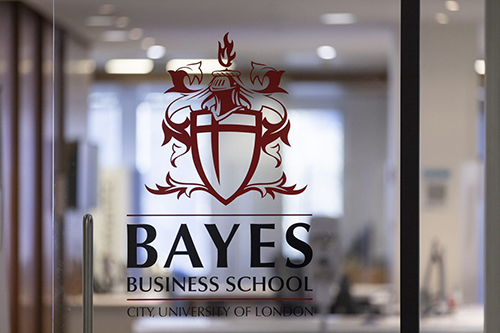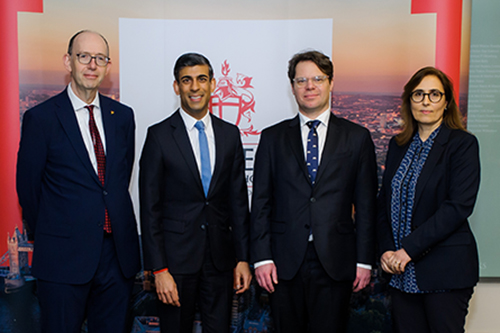By City Press Office (General enquiries), Published
Bayes Business School was proud to sponsor the Worshipful Company of World Traders’ 35th Annual Tacitus Lecture ‘Finance and the City in an Age of Historical Reckoning’ on 25 February 2022. The Lecture was delivered by historian and broadcaster Professor David Olusoga OBE at London’s Guildhall.
The Tacitus Lecture is the largest lecture of its type in the City of London, bringing together the international business community, City livery companies, educators and students. Amongst the invited audience were pupils from schools supported by the Charitable Trust of the World Traders Livery Company.
Professor Olusoga’s lecture highlighted the pervasive influence that the Atlantic slave trade still has today on UK social behaviour two centuries after abolition.
It focused on three men of the City of London whose wealth was underpinned and generated on the backs of enslaved Africans who were sold to work initially on Spanish and Portuguese and later British plantations in the Caribbean and North America. Two were former Members of Parliament, Edward Colston (1636-1721) and John Cass (1661-1718) who were closely involved in the management of the Royal African Company, the principle English slave trading company established under Charles II in 1660. The third was Alderman William Beckford (1709-1770), twice Lord Mayor of London in 1692 and 1669, whose grandfather was Governor of Jamaica, and who grew up to inherit 13 plantations and owned approximately 3,000 enslaved Africans.
The lecture began with a reminder of the notorious 1783 Zong Case heard by Lord Mansfield in London, when mass murder onboard a slave ship was deemed acceptable grounds for an insurance claim, and whose abhorrent details recorded in an English court of law gave added impetus to the abolitionist movement.
Professor Olusoga mentioned his belief in the Age of Historical Reckoning, a current moment of cultural shift. Rather than seeing history being erased, it was being created as hidden parts of Britain’s colonial past were rediscovered and brought to light through academic research and publication. In a generational awakening, young Britons were keen to reappraise their history – a subject Professor Olusoga stated was not a comfortable experience for many.
He highlighted the many prominent investors, including several Lord Mayors and Samuel Pepys, who had sought to make money from the trade in enslaved Africans through the purchase of shares in the Royal African Company. The use of Dutch engineering, financed by traders in the City of London to move from cotton to sugar plantations in Barbados further increased demand for slaves. The records of a visit there in 1645 by Sir George Downing, whose street is now home to UK Prime Ministers, details the rapid returns on investment to be made from this industry built upon enslaved labour and the scale of slavery on this tiny island.
Professor Olusoga explained how the capture of the much larger Jamaica in 1655 by the English brought about such a huge increase in British slave trading that the Royal African Company could no longer supply enough slaves for the demands of the island’s plantation owners, one third of them Scottish. Breaking the Company’s monopoly allowed traders in other British cities, Bristol, Glasgow and Liverpool to profit from the African slave trade alongside London. The Royal African Company moved from controlling 97 per cent of Atlantic slave trade in 1689 to eight per cent in 1701.
Covering the emotive subjective of historical statues to these leading merchants whose wealth was gained from slavery, Professor Olusoga explained they were mute and even with contextual notes could not properly explain the brutality of the slave trade, whereas historical documents spoke volumes. Statues are not delivery systems for history. Yet the re-examining of history highlighted how the slow and toxic evolution of culture related to slavery persisted in the inequality that the slave trade has left behind.
He quoted the 2019 European Social Survey, which is based at City, University of London, which found that 81 per cent of Britons today do not agree with the statement: “some races are born less intelligent than others”. Despite there being no scientific evidence for this statement, this means 19 per cent of Britons do believe in the statement and with this the implication that by being black and British nearly one in five people hold racist views prejudiced against you. This is not unconscious bias, but conscious bias and evidence that ideas prevalent in 21st century Britain date from the 17th and 18th centuries.
Professor Olusoga highlighted the work being done by academia and commercial companies who are genuine about diversity and inclusion - those who are keen to shift the dial by opening up their histories and confront the legacies of the past.
He also mentioned the name change of Bayes Business School in 2021.
“When the Bayes Business School announced its decision to adopt its new and current name the explanation given on the School’s website spoke not just of John Cass and his involvement to the Trans-Atlantic slave trade but – rightly – the persisting inequality that slavery has contributed to creating in the UK and across the world,” he said.
Professor Caroline Wiertz is the Deputy Dean of Bayes Business School. She said the School was proud to sponsor the Tacitus Lecture this year.
“As an educational institution, we are committed to learning more about our past. We want everyone to have an equal opportunity to contribute to, and influence, every part of our School and society.
“When we changed our name last year we also committed to ‘changing more than a name’ and are working hard to improve the experience and outcomes of our students from Black, Asian and Minority Ethnic backgrounds.
“It was an honour to listen to – and learn from – Professor Olusoga’s lecture and we support his scholarship and research.”


